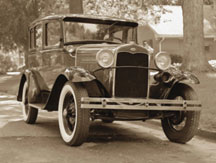
Glycerin in Antifreeze
A series of proposed new standards being developed by ASTM International Committee D15 on Engine Coolants would remove technical barriers that currently prevent the cost-effective replacement of ethylene glycol with more environmentally friendly glycerin in antifreeze. The proposed standards are under the jurisdiction of Subcommittee D15.93 on Research and Long Range Planning.
Natural glycerin is a co-product of renewable fats and oils that have been saponified, hydrolyzed or transesterified. Although glycerin, which is nontoxic to the environment, was used as a heat transfer agent in antifreeze formulations as early as 1920, it was eventually replaced by ethylene glycol in the 1930s due to cost considerations.
Increases in the production of biodiesel since 2004 have produced a surplus of glycerin in the global market, which has presented the possibility of a more cost-effective return of glycerin to antifreeze.
According to Deborah Baldwin, product manager for glycerin, Vantage Oleochemicals, Committee D15 first needed to determine what would be the appropriate grade of refined glycerin required to ensure compatibility with engine parts and seals."We settled on 99.5 percent pure glycerin," says Baldwin. "We then needed to determine what impurities were present in glycerin that need to be controlled and measured."
he subcommittee's work led to the development of two proposed standards, WK22966, Test Method for Determination of Glycerin Assay by Titrimetric (Sodium Meta Periodate), and WK22967, Test Method for Determination of Fatty Acids and Esters in Glycerin. Interlaboratory studies have been completed for each of these standards, which are now on ballot.
In addition to WK22966 and WK22967, additional proposed D15.93 glycerin standards are being developed:
- WK27254, Specification for Engine Coolant Grade 1,2,3 Propanetriol (Glycerin, Glycerol);
All interested parties are invited to become involved in the work of Committee D15.
CONTACT Technical Information: Deborah Baldwin, Vantage Oleochemicals • Chicago, Ill. • Phone: 773-650-7576 • E-mail: deborah.baldwin@vantageoleo.com O ASTM Staff: Joe Koury • Phone: 610-832-9804 • E-mail: jkoury@astm.org O Upcoming Meeting: May 18-19 • May Committee Week • St. Louis, Mo.Glycerin was used as a heat transfer agent in antifreeze formulations in the 1920s.
 SN Home
SN Home Archive
Archive Advertisers
Advertisers Masthead
Masthead RateCard
RateCard Subscribe
Subscribe Email Editor
Email Editor